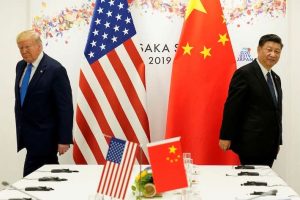With calls rising for China to pay pandemic reparations, in synopsis here are my views:
1. I do not think the US government can sue China in federal courts except in cases where sovereign immunity does not apply – like suing a Chinese state owned company for product liability in the US.
2. The US can sue the Chinese government in whatever (if any) Chinese courts the Chinese allow, providing the federal Constitution allows the federal government to sue in other than US federal courts. (I would presume the US government could be a party to such a suit under, for example, the status of forces agreement with South Korea.) But to the extent this is open for suit in Chinese court we are going to lose.
3. In international venues where the US has admitted limited jurisdiction in the past, such as the International Court of Justice in the Hague or the World Trade Organization, there is almost certainly an exception. However, the WTO works because China wants to be a member. Superpowers tend not to let themselves be dragged into the Hague (although the Europeans are very dutiful about it).
More on the ICJ
The International Court warrants further discussion. As a quick perusal of Wikipedia demonstrates, it has been criticized with respect to its rulings, its procedures, and its authority. As with criticisms of the United Nations, many of these criticisms refer more to the general authority assigned to the body by member states through its charter than to specific problems with the composition of judicial panels or their rulings.
Major criticisms include the following:
“Compulsory” jurisdiction is limited to cases where both parties have agreed to submit to its decision. Thus instances of aggression tend to be automatically escalated to and adjudicated by the UN Security Council.
According to the sovereignty principle of international law, no nation is superior to or inferior to another. Therefore, there is no entity that could force the states into practice of the law or punish the states in case any violation of international law occurs.
The absence of binding force means that the 193 member states of the ICJ do not necessarily have to accept the jurisdiction. Moreover, a country’s membership in the UN and ICJ does not give the court automatic jurisdiction over those member states. It is the consent of each state to recognize or not the court’s jurisdiction that matters.
And the International Court does not enjoy a full separation of powers. Permanent members of the Security Council can veto enforcement of rulings, even those to which they have consented to be bound.
Because the jurisdiction does not have binding force itself, in many cases instances of aggression are adjudicated by the Security Council’s adoption of a resolution.
There is, therefore, a likelihood for the permanent member states of the Security Council to avoid the legal responsibility brought up by the International Court of Justice, as shown in the example of Nicaragua v. United States.
Of course China and the US are both Security council members with veto power so there is no real possibility of an enforcement of judgment even if China agreed to be sued, which if I were China I probably would not do.
Hague cases work better when the Defendant stands to gain something by being cooperative.
Conclusion
I do not see a really good way to do anything beyond a publicity stunt. If we can get China they can get us. Can you imagine the US government allowing itself to be sued in that way? (Well, I suppose the Chinese could sue us in US court but with the same problem as in the second item above.)
So, realistically, I do not see it.
American lawyer Grady Loy, retired corporate counsel for a leading Japanese chemical company, currently is a freelance correspondent and commentator based in Yokohama.
























